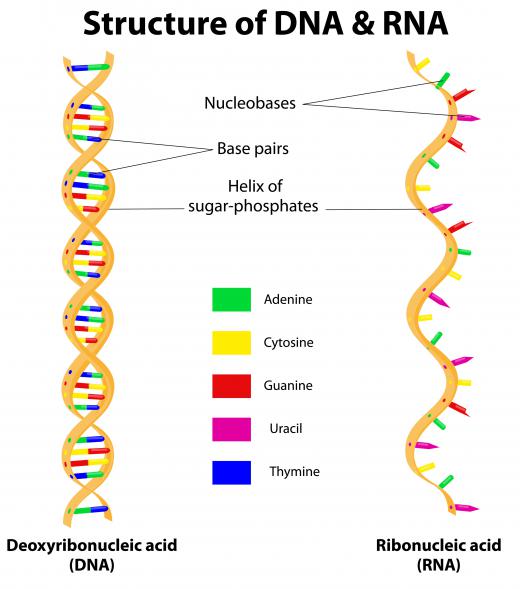What is Genomic DNA?
 Mary McMahon
Mary McMahon
Genomic DNA is the DNA that holds the complete set of genetic data for an organism. The term is used to distinguish this type of DNA from other kinds; although many people assume that all DNA is found in the genome, this is not, in fact, the case. Plasmids, for example, contain this genetic material, but this type is not part of the genome, even though it can be inherited and passed on to future generations.
In humans, the genomic DNA spans 46 chromosomes, providing a complete set of genetic information, including coding DNA that leads to the expression of genetic traits, and non-coding DNA which does not have this function. This genetic coding has been sequenced as part of the Human Genome Project, with the goal of eventually learning about the specific functions of various areas of the genome. Being able to locate specific genes and other information could be useful for diagnosis and eventual treatment of genetic conditions.

The DNA of several other organisms of interest has also been sequenced. Animals that are are subjects of genetic research, such as fruit flies, are popular targets for sequencing. With genetic information in hand, researchers can identify areas in which the genomic DNA varies from individual to individual. These variations can provide keys to a deeper understanding of genetic traits, including which areas of the genome are involved in expression of particular traits, and what causes expression to go awry, resulting in congenital abnormalities.

Many organisms have a complete set of this DNA in almost every cell. Within the cell, different operations determine which part of the genome is active, allowing the organism to create differentiated cells and to regulate cell function. Sometimes, this regulation does not go as intended, which can result in the development of malignancies and other problems as genes are not expressed properly, expressed when they should not be, or not expressed at all.
The detailed study of genomic DNA is a topic of interest around the world, with a field of study known as bioinformatics being used to analyze and quantify data obtained through the study of various genomes. Researchers can do things like manipulating DNA to learn more about regulation and genome function, as well as creating genome databases that can be shared with other researchers. Collaboration can be key to solving genetic puzzles, because the vast size of the genome makes it logistically impossible for a single researcher to make much headway.
AS FEATURED ON:
AS FEATURED ON:












Discussion Comments
It is incredible to think how deep the coding for living organisms runs. Computers have a code system which is complex enough, but they are not nearly as complex as any given person. So many of our inherited traits are a result of our inner coding, and the detail must be nearly infinitesimal.
Genomic DNA could be linked to virtually any aspect of a person's physiological or psychological makeup, and as such, traits related to DNA can be very difficult to trace. Scientists are making headway, however, and the human genome project continues to advance over time. It will be interesting to see if science can keep up with genes as they continue to mutate.
Post your comments